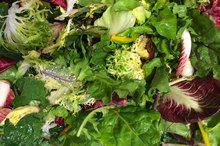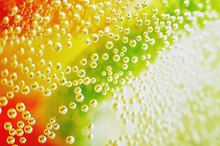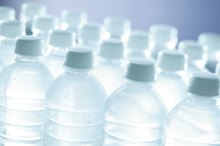What Are the Health Benefits of Drinking Pineapple Juice?
The pineapple is a sweet tropical fruit native to South America. Today, the pineapple is also cultivated in Asia and Hawaii. The Hawaiians established the first substantial pineapple plantation in the 19th century, but shifted pineapple processing to the Philippines, where Dole produces much of the world's pineapple juice today, to reduce labor costs. Pineapple juice provides a variety of nutritional benefits.
Low in Fat and Calories
An 8-ounce glass of pineapple juice contains 132 calories, or 7 percent of a standard 2,000-calorie diet. Pineapple juice is a sweet, refreshing beverage with far fewer calories than fattening foods. An 8-ounce serving of pineapple juice contains only 0.3 grams fat.
Vitamin C
Is Ruby Red Grapefruit Juice Good for You?
Learn More
The vitamin C content in 8 ounces of pineapple juice is 25 milligrams, or 42 percent of the 60 milligrams recommended daily intake. Vitamin C supports the immune system and prevents the development of illnesses and infections by stimulating the production and function of white blood cells. It also protects cells from oxidative damage that free radicals, toxic by-products of metabolism, can cause, according to a 2002 University of Colorado at Boulder study.
Potassium
An 8-ounce serving of pineapple juice provides 325 milligrams of potassium, or 9 percent of the 3,500 milligrams daily value. The body needs potassium to contract muscles, including the heart muscle and the intestinal muscles that stimulate waste elimination. These functions promote cardiovascular and digestive health. The potassium content is high in most fruits and vegetables. A diet that includes a high level of sodium increases the body's need for potassium because the minerals must exist in a balanced ratio. The intake of sodium is typically three times higher than the intake of potassium in the typical American diet, according to the Linus Pauling Institute.
- An 8-ounce serving of pineapple juice provides 325 milligrams of potassium, or 9 percent of the 3,500 milligrams daily value.
- The body needs potassium to contract muscles, including the heart muscle and the intestinal muscles that stimulate waste elimination.
Water
Nutritional Facts of Dole Pineapple Juice
Learn More
The water content in 8 ounces of pineapple juice is 86 percent. The consumption of an adequate fluid level is important for flushing toxins from the body through the urinary tract and providing the necessary fluid to regulate blood pressure. Warm weather and physical exercise increase the body's water requirements. Including pineapple juice in the diet can help prevent dehydration.
- The water content in 8 ounces of pineapple juice is 86 percent.
- Including pineapple juice in the diet can help prevent dehydration.
Related Articles
References
- MayoClinic.com: What Does Percent Daily Value Mean on Food Labels?
- Purdue University: Pineapple
- Linus Pauling Micronutrient Information Center: Potassium
- ScienceDaily.com: Vitamin C May Help "Juice Up" Metabolism In Older Adults, Offsetting Weight Gain
- Pineapple, raw. FoodData Central. U.S. Department of Agriculture. Published April 1, 2019.
- The glycemic index. Diabetes Canada. 2020.
- Copper. National Institutes of Health Office of Dietary Supplements. 2019.
- Bromelain. National Institutes of Health. National Center for Complementary and Integrated Health. Updated 2016.
- Muhammad ZA, Ahmad T. Therapeutic uses of pineapple-extracted bromelain in surgical care - A review. J Pak Med Assoc. 2017;67(1):121-125.
- van Eekelen E, Geelen A, Alssema M, et al. Sweet snacks are positively and fruits and vegetables are negatively associated with visceral or liver fat content in middle-aged men and women. J Nutr. 2019;149(2):304-313. doi:10.1093/jn/nxy260
- Vitamin C Fact Sheet for Health Professionals. National Institutes of Health. Office of Dietary Supplements. Updated 2019.
- Anderson JJ, Nieman DC. Diet quality-the Greeks had it right!. Nutrients. 2016;8(10). doi:10.3390/nu8100636
- Chang TC, Wei PL, Makondi PT, Chen WT, Huang CY, Chang YJ. Bromelain inhibits the ability of colorectal cancer cells to proliferate via activation of ROS production and autophagy. PLoS ONE. 2019;14(1):e0210274. doi:10.1371/journal.pone.0210274
- Ask the Expert: Anaphylactic Reactions to Cherries, Strawberries, and Grapes. American Academy of Allergy Asthma and Immunology. Milwaukee, Wisc. 2020.
- Possible interactions with: bromelain. Penn State Hershey Milton S. Hershey Medical Center. 2011.
- Pineapples. SNAP-Ed connection U.S. Department of Agriculture.
- Selecting and serving produce safely. U.S. Food and Drug Administration.
Writer Bio
Based in Richmond, Va., Tara Carson has written articles for editorial and corporate online and print publications for more than 10 years. She has experience as an adjunct professor of nutrition at Northwest Christian University and holds a Bachelor of Science in journalism and nutrition from Virginia Commonwealth University.









